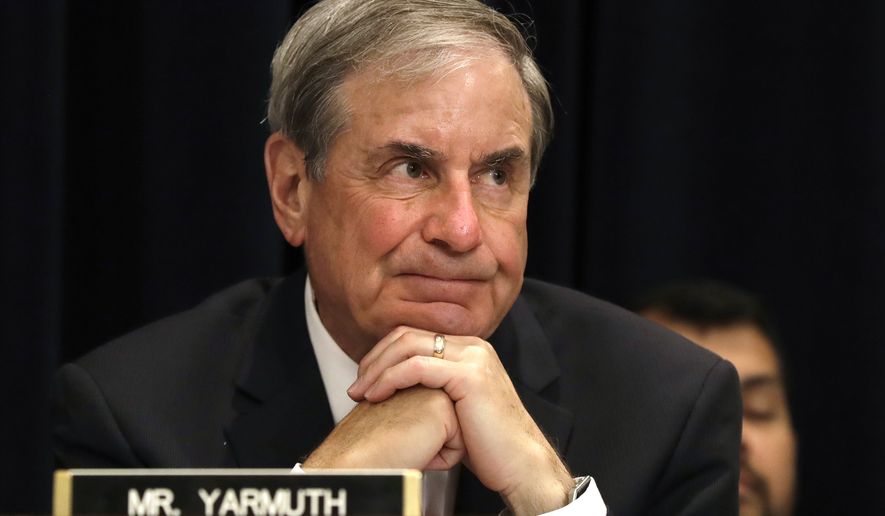The country’s fiscal picture is so bad that the new Democratic chairman of the House Budget Committee says he doesn’t see a realistic way to write a budget that will get to balance within a decade.
Rep. John Yarmuth of Kentucky says the plan he will draw up for Democrats likely will include tax increases, but even with those, lawmakers would have to resort to gimmicks to close the annual trillion-dollar deficits forecasted for the next decade.
“In a 10-year window, the deficits right now are too high,” Mr. Yarmuth said. “There’s no way to get it to balance without ludicrous assumptions.”
Mr. Yarmuth says he still plans to write a budget resolution for fiscal 2020 that would lower deficits over time, but suggested gains would be limited by political realities.
One option for cuts is rolling back some of the $1.5 trillion tax-cut law Republicans passed in 2017, including increasing the lowered corporate tax rate as well as the rate for the top individual tax bracket.
“I’m sure, just as our budget proposals over the last few years have included increases in revenue, this one will, too,” he told The Washington Times.
Yet it’s not clear whether his budget resolution will take any action on entitlement spending such as Social Security and Medicare, which with interest on the debt are the items that will send the deficit soaring from $779 billion in 2018 to a projected $1 trillion in 2020 and $1.5 trillion by 2028.
Rep. Steve Womack, Arkansas Republican, said until Democrats are willing to tackle entitlements, they will struggle with balancing budgets.
“They’re in denial on the true drivers of the deficit and the debt,” said Mr. Womack, the top Republican on the Budget Committee.
Mr. Womack, as chairman of the committee last year, wrote a blueprint that would have slashed $8.1 trillion in spending over 10 years and aimed to bring the budget to balance in nine years.
That plan envisioned $5.4 trillion in savings from mandatory spending programs, including more than $500 billion from Medicare and $1.5 trillion from Medicaid and other health programs.
Democrats, though, have signaled that they’re likely to boost, not cut, government spending on health care.
Mr. Yarmuth said his goal is to put together a 2020 budget blueprint before lawmakers break for the Easter holiday in April.
Congress is supposed to pass a non-binding budget resolution by April 15 every year, but there’s no real penalty for missing that deadline and lawmakers haven’t hit the target in years.
The biggest debates will be over whether to keep spending caps in place for discretionary spending and how far Democrats want to go in proposing tax increases.
Newly elected Rep. Alexandria Ocasio-Cortez of New York and other Democrats have recently suggested increasing the top marginal tax rate for individuals to about 70 percent for incomes of $10 million or greater as a way to help pay for other spending — not necessarily to reduce deficits.
Even then, it’s not clear there’s enough money available to make a big dent in the deficit.
Increasing the top tax rate, currently 37 percent for individuals making more than $510,300, to a top marginal rate of 70 percent for ordinary income over $10 million could raise between $189 billion and $291 billion over a decade, according to recent projections by the Tax Foundation.
If the 70 percent rate were applied to all income greater than $10 million, including from capital gains and dividends, the government could actually lose money over that period if enough people delayed selling their assets to avoid taking the immediate hit from the higher rate, the Tax Foundation said.
On the corporate tax side, Mr. Yarmuth said he wants to defer to the House Ways and Means Committee.
The 2017 GOP tax law lowered the corporate rate from 35 percent to its current level of 21 percent.
Increasing the rate by 1 percentage point, to 22 percent, would increase revenue by $96 billion over 10 years, according to a report released last month by the Congressional Budget Office.
Whatever Mr. Yarmuth ends up writing, it will be tough to reconcile with the Senate, still controlled by the GOP.
Senate Budget Committee Chairman Mike Enzi, Wyoming Republican, is planning to move forward with a full 2020 budget resolution this year, though the GOP has rejected Democrats’ calls for tax increases.
He said a number of options exist for how to proceed.
“It’s possible to write a resolution to do anything you want to, but it’s aspirational,” Mr. Enzi said.
Fiscal watchdogs said it’s an uphill climb at best to bring the budget into balance.
“Balancing the budget in 10 years is completely impossible,” said Brian Riedl, a senior fellow at the Manhattan Institute.
He said to balance in 2028, “Thirty percent of the projected government would have to be wiped out.” Even repealing the entire 2017 GOP tax law and eliminating all discretionary spending — an unthinkable proposal — might not enough, he said.
Mr. Riedl says the annual budget process — if and when either chamber goes through with it — essentially has become a public relations exercise.
“Republican budgets will assume completely undefined spending cuts, and Democratic budget resolutions will assume completely undefined revenue increases, and they will never spell out the specifics because they have no intention of actually carrying through anyway on the budget,” he said.
• David Sherfinski can be reached at dsherfinski@washingtontimes.com.




Please read our comment policy before commenting.